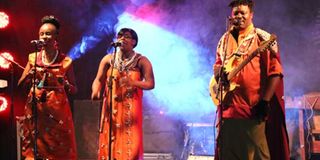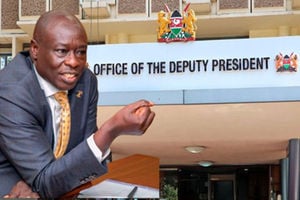Introducing Kombo and Afro Simba

Kombo Chokwe Burns (right) and members of the Afro Simba band perfroming. PHOTO | NATION CORRESPONDENT
What you need to know:
- Afro-fusion band sets sights on bigger things with release of their debut album, ‘Pandizo’, which took three years to make.
- Kombo, a successful musician in his own right, had played as a guitarist for the likes of Suzanna Owiyo, Eric Wainaina and Sauti Sol, touring the the world with them since 2005.
- The songs in the album, like folk songs that they draw from, talk about everyday life, like Kombo being away from home while still being home — moving from the coastal region to come live in Nairobi. It also calls on pride of one’s culture.
It has been a remarkable five years for Kombo Chokwe Burns and his Afro Simba band.
Kombo, a successful musician in his own right, had played as a guitarist for the likes of Suzanna Owiyo, Eric Wainaina and Sauti Sol, touring the the world with them since 2005. But not once did he dream of making music on his own despite the experience he gained playing with the ‘big boys’.
Then a lorry rammed his car in 2010.
After absorbing the shock of the incident, Kombo went on with his life, thankful to be alive.
It took him eight months to find out that the accident had damaged the nerves on his right shoulder when he realised he wasn’t able to move his hand.
He was operated on at Kijabe Mission Hospital, but the procedure didn’t give him back the use of his right hand immediately. So for one and a half years he had to relearn how to play the guitar, strumming with minimal movement, careful not to aggravate the injury.
This meant he had to stay away from the all-consuming live music. It was a period he did a lot of reflecting. And it was during this period that he found himself musically.
“The quiet moments gave me time to think. I rang up a few of the guys I had been playing with and told them I wanted to start a band,” says Kombo.
And so Afro Simba was born in late 2011
Kombo, being the frontman came up with the name of the band. He says he incorporated ‘simba’ so that anyone around the globe would identify the group’s African roots.
Their debut album, Pandizo, was released in November last year. The title is derived from a Mijikenda (Rabai) word.
FOLKSY SOUND
“If you go down to our coast, you’ll see etchings on coconut trees by people who climb them to pick coconut fruits. That is what we call pandizo. The band and I have also had to climb up, past several hurdles, in order to get to this point,” says Kombo.
The album was three years in the making and cost more than half a million shillings, as they searched for quality that would be at the same level as other top Afro-fusion artistes.
“It took long to get good engineers to master and mix. I know it would have been played here, but when you’re performing on the world stage your quality should be as good as those of other artistes at that level,” says Kombo.
The album contains some folk songs in the Mijikenda tradition, this being the identity the band Kombo envisioned. There are also his original compositions, although he did the arrangement for all the songs on the album.
“It’s refreshing to not only hear the new songs, but to also hear what he has done with the folk songs to make them his,” says Jamir Adiong, a reggae artiste based in the Philippines who has been working with Afro Simba in a sound they call ‘Asili dub’.
The songs in the album, like folk songs that they draw from, talk about everyday life, like Kombo being away from home while still being home — moving from the coastal region to come live in Nairobi. It also calls on pride of one’s culture.
The 10-track, roughly five-minute-each, album is rich with the electric guitar – Kombo’s instrument of choice. It also ranges in percussions – from the traditional drums and shakers, to modern drums and cymbals – to produce danceable and groovy songs that compel one to move a body part to, despite not understanding the language used. The album was produced with support of Synergy Music Production, Alliance Française, Ketebul Music and Culture Connect.
“We have an identity in Kenyan music that people don’t realise. It’s not that our music should sound the same. All 42 tribes in our country have an identity. This is what I hope to make the young artistes realise when they listen to the album,” says Kombo.
The band members include Water Mwang’ombe (keyboardist), Eddy Dena (bassist), Morris Kivisi (drummer), Ndune, aka Mukulukulu, (percussionist) and sometimes you have Bruno and Kazungu on the same. The background vocalists are Happy Wanje and Nimo. The band consists of seven members, but sometimes an eighth member is required due to the number of percussions that are used in Mijikenda music.





